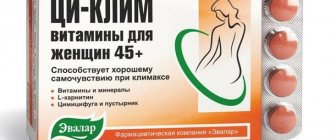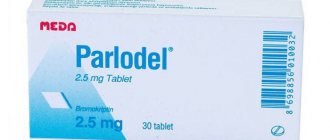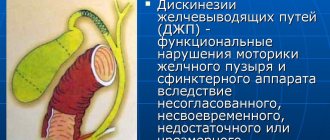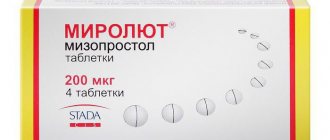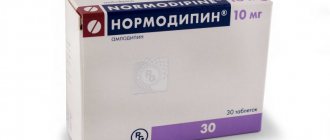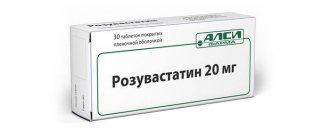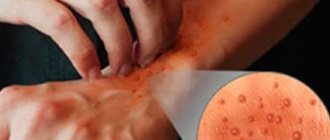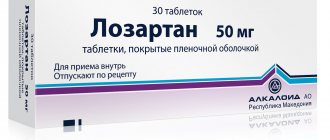Thyrocomb is a drug (tablets) that belongs to the category of drugs for the treatment of thyroid diseases. The instructions for use highlight the following features of the drug:
How to dissolve vascular plaques, normalize blood circulation, blood pressure and forget the way to the pharmacy
- Sold only with a doctor's prescription
- During pregnancy: possible
- When breastfeeding: with caution
- In childhood: with caution
- In old age: with caution
Pharmacodynamics and pharmacokinetics
Pharmacodynamics
A drug containing synthetic hormones liothyronine and levothyroxine, which are part of the thyroid hormones and potassium iodide, which is a structural element in the synthesis of thyroxine and triiodothyronine. The main purpose is to compensate for the lack of thyroid hormones in the body.
Thyroidcomb stimulates their growth and tissue differentiation, increases their need for oxygen, and increases the level of basal metabolism. In large doses it has a catabolic effect, in small doses it has an anabolic effect. Suppresses the synthesis of thyroid-stimulating hormone. Increases energy processes, has a positive effect on the cardiovascular and nervous systems, kidney and liver functions.
Pharmacokinetics
Levothyroxine, when taken orally, is absorbed in the upper part of the small intestine (up to 80% of the dose taken). The maximum concentration in the blood occurs after 6 hours. About 99% of the drug binds to blood proteins. The therapeutic effect appears 3-6 days after the start of administration.
Levothyroxine is metabolized in the liver, muscles, kidneys, and brain tissue. Metabolites are pharmacologically inactive and are excreted in urine and bile. The half-life of levothyroxine is one week.
Liothyronine is also predominantly absorbed in the small intestine (78-95% of the dose). The maximum concentration in the blood occurs on days 2-3. 7-9 days after the end of administration, the effect of the drug ceases. During pregnancy, there is an increase in binding capacity to blood proteins. with hypoproteinemia, the binding ability decreases. Metabolized in the liver, muscles, brain tissue, kidneys. The half-life of liothyronine is one day. Inorganic iodine is almost completely absorbed in the small intestine. Excreted in urine.
special instructions
In patients with heart failure, tachyarrhythmias, or coronary artery disease, thyroid hormone levels should be monitored more often than in other patients.
For elderly patients, Thyreocomb is prescribed in lower doses. In children suffering from epilepsy, the use of the drug may increase the number of seizures.
In case of adrenal insufficiency, diabetes mellitus or diabetes insipidus, Thyrocomb can increase the severity of these diseases, therefore it is necessary to carefully select drugs for the treatment of these diseases.
If there is a lack of thyroid hormones due to damage to the pituitary gland, it is necessary to find out whether there is simultaneous insufficiency of the adrenal cortex. Glucocorticosteroid replacement therapy must be started before thyroid hormones are prescribed, otherwise acute adrenal insufficiency may develop.
Thyroidcomb does not affect the ability to drive vehicles and other potentially dangerous mechanisms.
Thyreocomb, instructions for use (Method and dosage)
The dose of the drug is individual and is selected by the doctor taking into account the clinic and laboratory examination data. The entire daily dose should be taken once, in the morning, 30-45 minutes before breakfast, do not chew the tablets, and wash it down with water. The drug should be taken regularly. As a rule, start with a dose of 1/2 tablet of the drug per day. The initial dose, depending on need, can be increased to the maintenance dose level (1-2 tablets) every 1-2 weeks.
For elderly patients with cardiovascular diseases, epilepsy and patients with adrenal insufficiency, the period for selecting an effective dose of Thyreocomb and adaptation to it should be increased to 1-1.5 months or more. The duration of taking the drug is determined for each patient separately. Do not change the dose or stop treatment on your own.
Contraindications
Absolute:
- adrenal insufficiency (untreated);
- acute myocarditis;
- acute myocardial infarction;
- thyrotoxicosis;
- Dühring's disease (dermatitis herpetiformis);
- angina pectoris (III–IV functional class);
- hypersensitivity to the main or auxiliary components of the drug.
Relative (Thyreocomb is used with caution):
- arterial hypertension;
- tachyarrhythmia;
- heart failure;
- cardiac ischemia;
- tachycardia;
- severe long-term hypothyroidism;
- diabetes mellitus and diabetes insipidus;
- glucose-galactose malabsorption syndrome;
- elderly age.
Interaction
Thyrocomb enhances the effectiveness of indirect anticoagulants, which may require dose adjustment. When taking the drug simultaneously with phenytoin, dicumarol, clofibrate, salicylates or furosemide at a dosage above 250 mg, the effect of Thyreocomb is enhanced. Taking tricyclic antidepressants together with Thyroidcomb may enhance the effectiveness of antidepressants.
When taking Thyreocomb simultaneously with potassium-sparing diuretics, the level of potassium in the blood may increase. The effect of cardiac glycosides is reduced when taking Thyreocomb. When taken simultaneously with anabolic steroids, Tamoxifen may cause a pharmacokinetic interaction between the drugs at the level of protein binding.
Taking carbamazepine, rifampicin and phenobarbital increases the clearance of levothyroxine and there may be a need to increase the dose of Thyrocomb. The drug, when used simultaneously with Somatropin, accelerates the process of closing the epiphyseal growth zones.
Side effects
With the correct dose, no side effects occur.
If the dose of the drug is chosen incorrectly, progression of angina, heart failure and allergic reactions is possible. Hypersensitivity reactions in combination with iodine rhinitis, exfoliative dermatitis, iodine fever, iododerma, iodine acne, Quincke's edema, and swelling of the salivary glands are very rarely observed.
If side effects develop, you should stop taking the drug and inform your doctor.
Reviews about Thyreocomb
Thyroid hormones increase basal metabolism and stimulate the breakdown of fats, proteins and carbohydrates. It is this action that underlies the use of hormones for weight loss. In this regard, Thyreocomb is often used for weight loss. This is evidenced by reviews, questions and discussions on forums dedicated to this topic.
This is justified if the drug is prescribed by a doctor after studying hormone levels. If their production is insufficient and the clinical picture of hypothyroidism of varying severity is indicated, taking this drug is indicated for the purpose of replacement therapy. The specialist prescribes the drug in doses that are necessary to compensate for this condition.
And it is completely unreasonable and downright dangerous to take hormones on your own to speed up the process of weight loss. Uncontrolled intake of hormones leads to severe endocrine disorders - hyperthyroidism with symptoms of thyrotoxicosis: tachycardia, agitation and insomnia. Considering that the drug contains potassium iodide, and the body does not need it, it will have a depressing effect on the secretion of thyroid-stimulating hormone. It turns out that this is a dangerous method for dealing with extra pounds.
Regarding the use of this drug for hypothyroidism. Combination drugs that contain synthetic hormones (Thyreocomb, Thyrotom, Novotiral) are practically not used by endocrinologists at present. They were replaced by monopreparations with L-thyroxine absolutely identical to the natural human hormone T4 - Euthyrox and L-thyroxine, which ensure the maintenance of the level of total thyroxine in the body.
In addition to levothyroxine (an analogue of T4), combined preparations contain liothyronine (an analogue of T3), the intake of which creates peak concentrations in the blood and has negative consequences on the body. Concentration peaks are less desirable for the body than their absence. In combination drugs, the ratio of hormones is not physiological; the advantages of combination drugs over monotherapy have not been identified, and they have been replaced by single drugs for the treatment of hypothyroidism. This explains the absence of Thyreocomb, Thyrotom and others in the pharmacy chain since 2011.
Release form and composition
The dosage form of Thyreocomb is tablets: white, round, flat-cylindrical with a beveled edge (in blisters of 10 or 25 pcs., in a cardboard pack 2 or 4 blisters; in bottles of 40 pcs. in a cardboard pack 1 bottle).
Active ingredients in 1 tablet:
- potassium iodide – 0.15 mg;
- levothyroxine – 0.07 mg;
- liothyronine – 0.01 mg.
Excipients: lactose monohydrate, propyl parahydroxybenzoate, methyl parahydroxybenzoate, talc, gelatin, corn starch, colloidal silicon dioxide, magnesium stearate, sodium hydroxide, 85% glycerin.
Analogs
L-Thyroxine
Berlin-Chemie AG/Menarini, Germany
OZON LLC, Russia
JSC “Farmak”, Ukraine
Price: 125 rub.
The thyroid-stimulating remedy L-Thyroxine was created to suppress excessive thyroid function. Its chemical composition contains sodium levothyroxine. It is produced in pills, which are placed in packages of 25,50 and 100 pieces.
Pros:
- There are large volumes of tablets
- Effective
- Small price.
Minuses:
- Inconvenient reception (30-40 minutes before breakfast)
- Often counterfeited
- There may be side effects.
Tyreocomb
- Name of the drug : Thyreocomb, tablets
- International nonproprietary name : Levothyroxine Sodium (levothyroxine Sodium) Liothyronine (liothyronine) Potassium Iodide (potassium Iodide)
- Manufacturer : Berlin-Chemie, Menarini Group, Germany
- Brief description : Thyroid treatment
- Average price for the drug : 230 rubles
Indications
Hypothyroidism; euthyroid goiter (in children and adolescents); euthyroid diffuse goiter (in adults, including during pregnancy); prevention of goiter recurrence (after resection or treatment with radioactive iodine I 131).
Dosage regimen
Inside, if possible on an empty stomach; starting from 0.5-2.5 tablets per day, if necessary, gradually increasing the dose to 4-6 tablets per day (in a hospital setting - up to 150 mcg/day of liothyronine); for school-age children - an initial dose of 0.25-0.5 tablets daily, then - 100-150 mcg of levothyroxine per 1 sq.m of body surface. To prevent goiter relapse - daily, 1-3 tablets (school-age children - 0.5-2 tablets). Special caution is required when used in patients with coronary atherosclerosis, because attacks of angina are possible (doses not exceeding 5-10 mcg/day of liothyronine). Increasing the dose in these patients should be carried out under ECG monitoring.
pharmachologic effect
A standardized preparation of thyroid hormones. Stimulates the metabolism of proteins, fats, carbohydrates; increases the functional activity of the CCC and the central nervous system, increases the tissue need for oxygen. In large doses, it inhibits the production of TTRH from the hypothalamus and TSH from the pituitary gland. Potassium iodide, with normal iodine content in the environment, inhibits the synthesis of thyroid hormones and their release from thyroglobulin. Liothyronine is absorbed faster and more completely than thyroidine and has a faster effect (the initial manifestation of the effect is noted after 4-8 hours).
Contraindications
Hypersensitivity. Hyperthyroidism, acute myocardial infarction; angina pectoris or myocardial infarction in elderly patients; myocarditis, untreated dysfunction of the adrenal cortex.
Side effect
Symptoms of hyperthyroidism (finger tremor, tachycardia, increased sweating, insomnia, glucosuria, angina pectoris, arrhythmias, diarrhea, weight loss, anxiety). Allergic reactions.
special instructions
When replacing thyroidin with thyroidin, it is assumed that 20-40 mcg of thyroidin corresponds to 0.1 g of thyroidin.
Drug interactions
Thyroid hormones increase the blood levels of phenytoin, salicylates, furosemide, and clofibrate. Cholestyramine inhibits the absorption of the drug. Increases the effect of oral anticoagulants, reduces hypoglycemic agents. Iodine deficiency increases, and excess reduces, the response to thyreostatic drugs. Perchlorate reduces iodine absorption by the thyroid gland. TSH stimulates the uptake and conversion of iodine by the thyroid gland.
Overdose
Symptoms of thyrotoxicosis (especially if the dose is increased too quickly at the beginning of treatment): palpitations, irregular heart rhythm, finger tremors, internal restlessness, insomnia, increased sweating, weight loss, diarrhea.
Treatment: depending on the severity of symptoms, the doctor may recommend reducing the daily dose of the drug, a break in treatment for several days, or prescribing beta-blockers. After side effects disappear, treatment should be started with caution at a lower dose. In case of acute overdose and intoxication, it is recommended to stop taking the drug and conduct a follow-up examination. Thyrostatic drugs are not recommended. When using the drug in very high doses, plasmapheresis is indicated.
